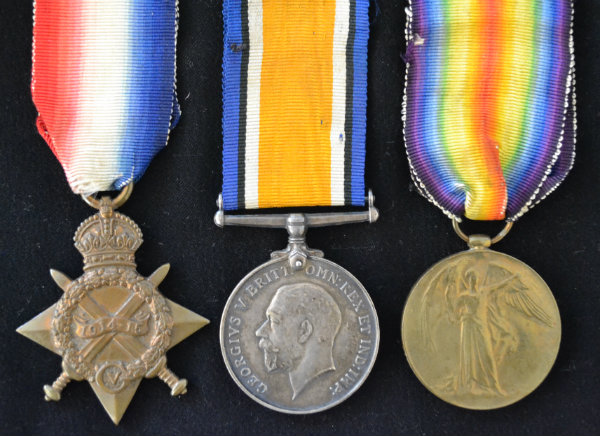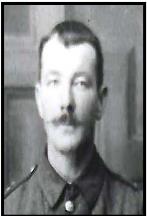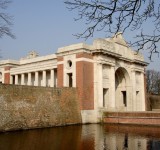Personal Details
Thomas was born in Bargates, Whitchurch in April 1874, the second son of Patrick, a labourer in a local Iron Foundry, and Harriett Travers of Yardington, Whitchurch, Shropshire. He had two sisters, Elizabeth and Catherine, and two brothers, John and Patrick.
The 1891 Census shows Thomas lodging in Dee Lane, Holt, Denbighshire, and working as a brickmaker.
Thomas married Mary Ellen Slawson in Whitchurch 1905. They had four children, Patrick (b. 1905), Harriett (b. 1909), Mary (b. 1911), and Beatrice (b. 1915). They lived in Barlow’s Yard, (High Street) Whitchurch. Thomas worked as a labourer in a corn mill before being mobilised (Special Reservist) in August 1914, landing in France on 18th February 1915.
Military Details
Regiment : 2nd Battalion King’s Shropshire Light Infantry
Rank : Private
Service Number : SR/7242
Thomas was mobilised (Special Reservist) in August 1914, landed in France on the 18th February 1915
Killed in Action France 13th April 1915

The 1914 Star (also known as 'Pip') was authorised under Special Army Order no. 350 in November 1917 and by an Admiralty Fleet Order in 1918, for award to officers and men of the British and Indian Expeditionary Forces who served in France or Belgium between 5 August and midnight of 22–23 November 1914. The former date is the day after Britain's declaration of war against the Central Powers, and the closing date marks the end of the First Battle of Ypres.
The 1914–15 Star (also known as 'Pip') was instituted in December 1918 and was awarded to officers and men of British and Imperial forces who served against the Central European Powers in any theatre of the Great War between 5 August 1914 and 31 December 1915. The period of eligibility was prior to the introduction of the Military Service Act 1916, which instituted conscription in Britain.
The British War Medal (also known as 'Squeak') was a silver or bronze medal awarded to officers and men of the British and Imperial Forces who either entered a theatre of war or entered service overseas between 5th August 1914 and 11th November 1918 inclusive. This was later extended to services in Russia, Siberia and some other areas in 1919 and 1920. Approximately 6.5 million British War Medals were issued. Approximately 6.4 million of these were the silver versions of this medal. Around 110,000 of a bronze version were issued mainly to Chinese, Maltese and Indian Labour Corps. The front (obv or obverse) of the medal depicts the head of George V. The recipient's service number, rank, name and unit was impressed on the rim.
The Allied Victory Medal (also known as 'Wilfred') was issued by each of the allies. It was decided that each of the allies should each issue their own bronze victory medal with a similar design, similar equivalent wording and identical ribbon. The British medal was designed by W. McMillan. The front depicts a winged classical figure representing victory. Approximately 5.7 million victory medals were issued. Interestingly, eligibility for this medal was more restrictive and not everyone who received the British War Medal ('Squeak') also received the Victory Medal ('Wilfred'). However, in general, all recipients of 'Wilfred' also received 'Squeak' and all recipients of The 1914 Star or The 1914/1915 Star (also known as 'Pip') also received both 'Squeak' and 'Wilfred'. The recipient's service number, rank, name and unit was impressed on the rim.
Further Information
Report in the Shrewsbury News & Wellington Journal April 1915 on the death of Thomas Travers.
“Whitchurch has made a splendid response to the call to arms and many of her gallant sons have already given proof of that British pluck and determination that will eventually result in crushing Prussian militarism. In this life and death struggle Shropshire has to deplore the loss of many sons, and one of those who have nobly given his life to King and Country is Private Thomas Travers, 2nd Shropshire L. I., whose home was at Barlow’s Yard, Whitchurch, and who was killed in action on April 13th being shot whilst engaged in digging a trench and dying almost immediately. Private Travers was in his 40th year and a bag maker by trade; he joined the Shropshire’s in September, and had been with the 2nd Battalion in France since February 1915. He was married, and leaves a widow and four children, with whom the greatest sympathy is felt.”
Shrewsbury News & Wellington Journal April 1915
Letter received by Mrs Travers
“Private Thomas Travers had been killed on the 13th digging trenches at the time, and was shot in the stomach, dying shortly afterwards in practically no pain. He was a very good soldier and I am very sorry to lose him. Deepest sympathy is felt with the widow and children in their bereavement.”
Lieutenant L J B Lloyd
Whitchurch Herald 24th April 1915
If you can provide any further information on Thomas Travers please get in touch by leaving a comment below, using our Contact Form or by calling in to Whitchurch Heritage Centre.
Information provided by Terry Evanson Whitchurch, Shropshire and Whitchurch Museum and Archives



Hello
I am trying to find a picture of Thomas Travers, my great Uncle and would be obliged if anyone who had any sources or leads would let me know.
Many thanks
Chris price
Hi Chris
We are back in the museum week commencing 8th January.
I don’t recall a photograph but we will certainly look through our archives for you.
Regards
Judith
(volunteer curator)
Thomas was my Great Grandfather. My mother remembered that she had various pictures of Thomas and the family at the time of the Great War Centenerary in 2014, and circulated them around the family and I understand these have now found their way to Chris. I remember my Grandmother telling about her Father’s death when I was quite small, so I was quite moved by the pictures when I saw them; I can’t imagine how the family would’ve coped with the grief. I’m a bit of a musician and have just produced some music to tell something of their story alongside their pictures, you can find it at https://youtu.be/CSRhUx9A01U